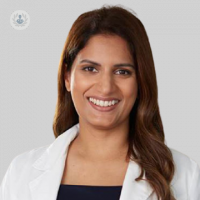Acne FAQs: Ask an expert
Written by:Although acne is a relatively common condition, its presence can seriously affect a person’s confidence and self-esteem. For expert insight on the skin disorder, we invited highly-respected consultant dermatologist Dr Ophelia Veraitch to answer some commonly asked questions about acne. In this informative article, the leading specialist also explains what's known about its causes, as well as detailing the available treatment options.

What are the known main causes of acne? How and why exactly does it form?
Acne is a common chronic disorder that's usually caused by blockages in the hair follicles and sebaceous glands, which leads to inflammation and pustules. It's most common in adolescents and young adults, but can also affect children and adults of all ages. The exact cause of acne isn't fully understood. However, there are a number of factors at play which include:
- Bacteria
- Hormones
- Familial tendency
- Distension and occlusion of hair follicles.
Flare ups can be caused by polycystic ovary syndrome, drugs, occlusive cosmetics, as well as humidity and diet.
When is acne considered to be dangerous to one's skin?
Acne can be dangerous to one's skin because of the scarring it can cause. Although there are a number of treatments available for scarring, it's always best to take steps in order to prevent scarring from developing in the first place. Also, it's important to consider if the acne is a sign of something else, for example PCOS. It's also vital that we don't underestimate the huge impact on mental health that acne can have.
Is it a hereditary condition? Do genetics come into play?
Genetics have a relatively minor role to play in acne. It isn't the major cause of having acne, but it can contribute. There are some rare syndromes, known as follicular occlusion syndromes, which have more evidence for a genetic tendency. Acne is one of the conditions that can be a part of these syndromes.
How is acne treated?
Acne is treated with rationalised skincare, including active ingredients in serum such as acne day serum and acne night serum. Key active ingredients in these serums include tretinoin which is the prescription-grade retinoid that increases cell turnover, so helps 'unclog' the skin (and has powerful anti-ageing effects too!).
Azealic acid and salicylic acids also help decongest blocked pores. Antibiotic clindamycin is of benefit for its anti-inflammatory properties and also by targeting the bacteria (known as cutibacterium acnes or p.acnes) that we know is involved in acne development.
Is surgery ever required?
Yes, in some cases surgery can be required to help treat acne. Sometimes injecting big cystic spots with steroids can help to clear inflammation, though this should only be done by an experienced dermatologist as over injection can cause skin thinning and 'dipped' scarring.
Sometimes surgery is necessary in order to reduce the scarring that has been caused by acne. In this case a subcision will be made in order to lift the skin away from the scar tissue to improve cosmesis (the skin's appearance). This isn't as commonly required if acne is treated early.
If you are seeking treatment for acne or would like more information, you can book a consultation with Dr Veraitch by visiting her Top Doctors profile.


